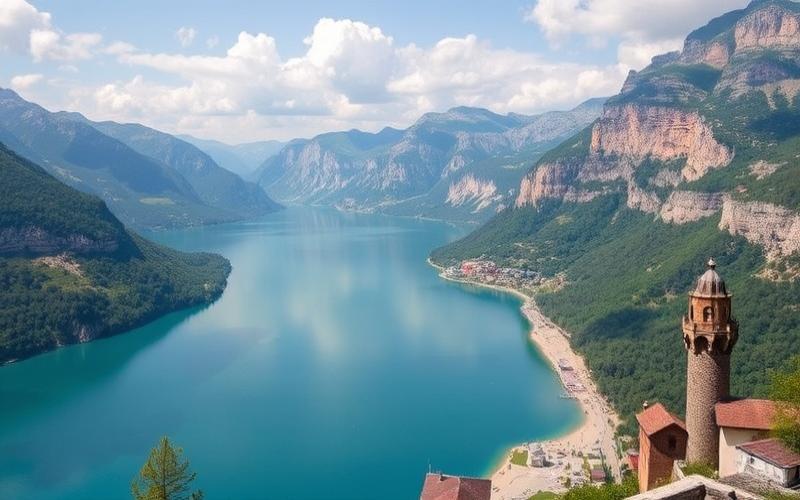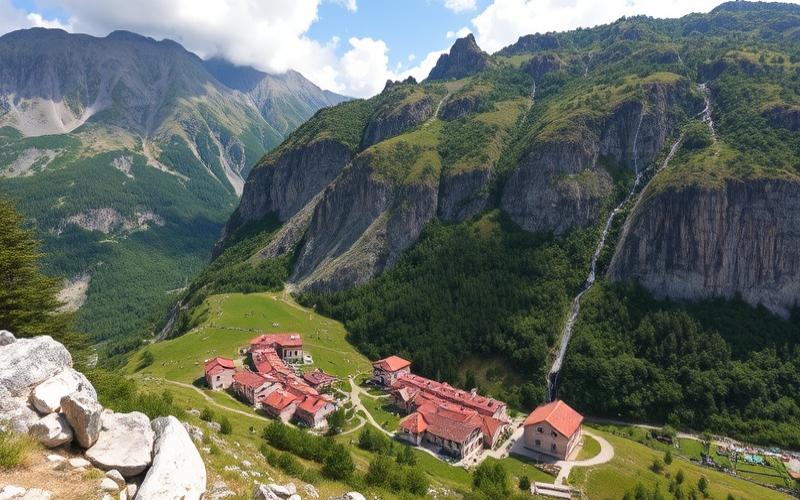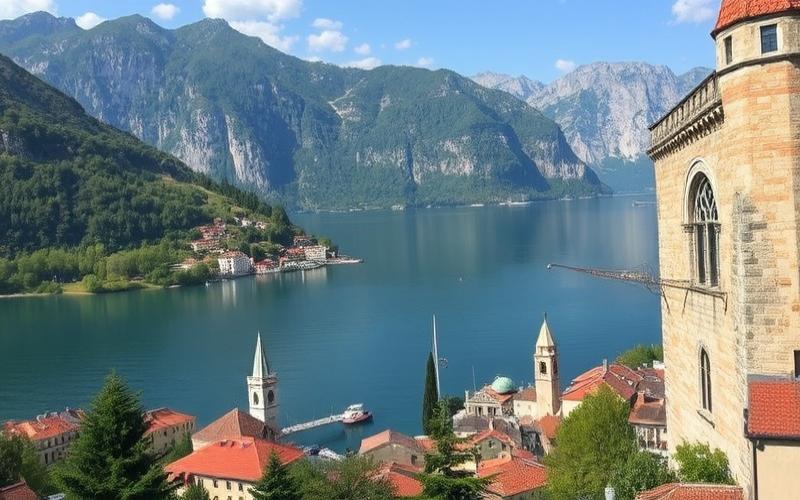
 Published on and written by Cyril Jarnias
Published on and written by Cyril Jarnias
In a context where technological innovation is transforming all sectors, Montenegro is no exception with notable growth in “proptech”—companies that innovatively combine real estate and technology.
This dynamic movement is redefining how we buy, sell, and manage real estate properties by introducing digital tools that streamline transaction processes and enhance user experience.
These advancements, although recent in the country, are beginning to significantly influence the local real estate market, attracting both foreign investment and national talent eager to participate in this digital real estate revolution.
Local Startups Transforming Montenegro’s Real Estate Landscape
Proptech, a blend of “property” and “technology,” refers to all technological innovations applied to the real estate sector. It aims to digitize and optimize all real estate-related processes, from construction to management, including sales, rentals, and financing. Proptech solutions notably include virtual tours, 3D modeling, online valuation platforms, smart home management, and real estate crowdfunding. In Montenegro’s context, marked by rapid real estate market growth and increased demand for transparency and operational efficiency, the rise of these technologies makes perfect sense.
In Montenegro, several local startups are emerging as innovation drivers in this sector:
| Startup | Main Domain | Innovations Introduced | Concrete Examples |
|---|---|---|---|
| RealEstate.me | Transactional Platform | Intelligent property search; automated client-product matching; personalized mobile alerts | AI-based recommendation engine to find properties matching user profiles |
| PropMontenegro | Rental & Smart Property Management | Cloud solutions for real estate management; interactive dashboards for owners/investors | SaaS application for real-time rent tracking and maintenance |
| SmartBuilds | Connected Construction & Renovation | IoT integration in new or renovated buildings; centralized energy monitoring | Smart sensors integrated into new residential projects |
Among the concrete innovations offered:
- Automated property valuation systems enabling instant estimates based on big data.
- Mobile applications offering immersive virtual tours.
- Platforms fully digitizing administrative procedures (electronic contracts).
- Collaborative tools between traditional agencies and independents via open APIs.
The impact on the local market is notable:
- Accelerated transaction processes: fewer physical intermediaries needed.
- Increased client expectations regarding service (greater transparency).
- Progressive transformation of traditional agencies’ roles, shifting towards more personalized consulting or partnering with new tech platforms.
“The Montenegrin market is still young but very receptive to digital solutions that genuinely simplify life for both end-users and professionals,” analyzes Ana Popović, CEO at RealEstate.me.
However, significant challenges remain:
- Limited digital education among some traditional players.
- Sometimes unclear regulations around electronic transactions.
- Restricted access to local funding dedicated to tech innovation.
But these obstacles are also seen as opportunities: increased training in digital tools would allow the entire sector to make a major qualitative leap, while regulatory clarification would encourage more foreign investment in such startups.
In summary:
Summary List – Main Opportunities
- Accelerated digitalization of the customer journey
- Increased transparency in real estate operations
- New data sources exploitable through IoT
Summary List – Main Challenges
- Uneven adoption among historical players
- Urgent need to adapt the legal framework
Thus, Montenegro is shaping a landscape where innovation rhymes with profound yet gradual transformation of the national real estate sector.
Good to Know:
Proptech, short for “property technology,” refers to the use of innovative technologies to transform the real estate industry, and it’s becoming a crucial driver in Montenegro with the emergence of numerous local startups. Companies like “Montenegro Real Estate Tech” introduce AI-based real estate management solutions, while “Balkan Prop Digit” offers virtual reality platforms for remote property viewing. This digital transformation is changing the local real estate market by making transactions more transparent and efficient, encouraging traditional players to modernize their approaches. Ognjen Petrovic, a Montenegrin proptech expert, emphasizes that “technological innovation is essential to attract foreign investors.” However, these startups face challenges, particularly in funding and regulation, although the developing market offers great opportunities to restructure traditional Montenegrin real estate.
Proptech Innovations Redefining Montenegro’s Market
Montenegrin real estate companies are accelerating their transformation through the adoption of innovative proptech technologies, disrupting traditional practices and improving user experience.
Emerging Technologies Adopted in Montenegro
- Artificial Intelligence (AI): Automation of real estate management, predictive price analysis, and customer relationship optimization through chatbots or virtual assistants.
- Digitization of Transactional Processes: Platforms enabling electronic signatures, real-time transaction tracking, and full digitization of the buying/selling journey.
- Augmented Reality (AR) and Virtual Reality (VR): Immersive tools for interactive virtual tours, 3D modeling of properties, or layout projections.
| Technology | Use Case in Real Estate | Impact on Practices |
|---|---|---|
| AI | Automated management, chatbots | Time savings, better customer personalization |
| Digitization | Electronic signatures | Reduced delays & errors |
| AR/VR | Virtual tours | Enhanced user experience |
Case Studies and Local Testimonials
- The startup STARKO develops an AI-based solution to automate customer support in various sectors including real estate; it benefits from support by the Science and Technology Park of Montenegro. This technology streamlines communication with potential clients while reducing operational costs.
- Several companies hosted at the Science and Technology Park actively participate in this digital dynamic by offering digital platforms or connected tools that facilitate daily work and access to international markets.
“The dynamism generated by these innovations is now attracting foreign investors as well as European institutional partners, positioning the country as a regional hub for proptech solutions.”
Economic and Regulatory Impacts
Economic Effects
- Accelerated real estate transaction cycle
- Improved market transparency
- Opening to international clientele through increased digitization
Regulatory Issues
- Progressive adaptation of the legal framework to new digital practices (recognized electronic signatures)
- Growing need for cybersecurity and personal data protection
Main Challenges
- Relative lack of human resources specialized in these new technologies
- Need for strengthened collaboration between public/private players to ensure coherent deployment
- Ongoing awareness among end-users to ensure effective adoption
Future Prospects
The recent implementation of the MontEDIH project—Digital Innovation Hub—should further strengthen this innovative dynamic: it aims to widely disseminate these technologies to local SMEs, including in real estate. Increasing integration with European standards also opens privileged access to international funding and best sector practices.
In this promising yet competitive context, only players capable of sustainably investing in their digital infrastructures while quickly adapting to regulatory changes will fully seize the opportunities offered by Montenegro’s proptech revolution.
Good to Know:
Real estate companies in Montenegro are increasingly adopting proptech innovations such as AI to optimize asset management, digitizing transactional processes for smoother transactions, and using augmented reality platforms to enrich the buying experience. Local companies like Real Estate Montenegro report a 30% reduction in sales times thanks to these technologies, while case studies show that digitization also improves transaction transparency. Although these innovations energize the market, they also pose regulatory challenges, particularly regarding data protection and cybersecurity, topics to which Montenegrin regulators must quickly adapt. The growing integration of proptech also raises questions about the future of traditional real estate professions, but it opens the way to new training and specialization opportunities in this evolving sector.
The Role of Blockchain in Montenegro’s Real Estate Transactions
The evolution of blockchain technology in the global real estate sector has profoundly transformed how transactions are conducted. Initially developed to secure and record cryptocurrency operations, blockchain is now used to enhance transparency, speed up processes, and reduce real estate transaction costs internationally.
List of Blockchain’s Main Contributions to the Global Real Estate Sector:
- Securing land titles through an immutable ledger
- Contract automation via smart contracts
- Significant reduction in delays and fees related to intermediaries
- Enhanced traceability and fraud limitation
- Possibility of asset acquisition with various cryptocurrencies
Montenegro is part of this global trend by allowing property purchases with several major cryptocurrencies like Bitcoin, Ethereum, or Litecoin. This option is gaining popularity among international buyers seeking confidentiality, speed, and efficiency in their transactions.
Comparative Table: Perceived Advantages of Using Blockchain in Montenegro’s Real Estate
| Aspect | Benefits Brought by Blockchain |
|---|---|
| Transparency | Unfalsifiable public ledger |
| Security | Transactions verified by decentralized consensus |
| Speed | Near-instant transfer (e.g., 10 minutes) |
| Reduced Fees | Lower commissions than with banks |
| Confidentiality | Parties masked, independence from banks |
Regulatory Context in Montenegro
Legally, although the country has not yet officially recognized the legal status of cryptocurrencies as official currency or universal payment method for all types of property acquisitions, there is growing regulatory tolerance allowing specialized agencies to offer this service. Some agencies work hand in hand with specialized lawyers to ensure maximum compliance when appearing before notaries to formalize these sales.
The common practice involves going through an experienced real estate agent or proptech agency that accompanies the buyer and seller throughout the process: crypto-to-euro conversion if necessary, notarial verification adapted to each specific case.
Concrete Examples of Active Montenegrin Proptech Companies:
- MD Realty has offered foreign clients since 2024/2025 a complete catalog accessible in Bitcoin/Ethereum/Litecoin.
- Platforms such as CryptoRealEstate regularly list houses/villas/apartments available for direct payment in crypto assets.
Current Challenges:
- Lack of national legislative uniformity on widespread blockchain/crypto payment usage.
- Dependence on certain professionals (notaries/lawyers) accepting this type of innovative transaction.
- Sometimes inadequate local technological infrastructures to guarantee a completely smooth experience without additional human intervention.
Future Perspectives:
If state adoption broadens, one can envision:
- Upcoming creation of a national land registry backed by a public blockchain solution,
- Progressive expansion of the professional network specifically trained in these new practices,
- Increased attractiveness to global investors seeking legal security and operational flexibility,
- Montenegro’s pioneering regional positioning as a Mediterranean proptech hub thanks to its relative openness to crypto/blockchain innovations.
Good to Know:
Blockchain technology, which first transformed the financial sector, is now extending to the global real estate market by improving transaction transparency and security. In Montenegro, although adoption is still nascent, the regulatory framework is evolving to support the integration of this technology. Montenegrin proptech companies, such as RealEstateChain, illustrate this trend by using blockchain to simplify transactions, ensure security, and prevent fraud via smart contracts. However, the country must overcome challenges, including the need for robust technological infrastructures and widespread adoption. In the future, developing public-private partnerships and educational initiatives could accelerate blockchain implementation, creating a more efficient and secure real estate environment.
Disclaimer: The information provided on this website is for informational purposes only and does not constitute financial, legal, or professional advice. We encourage you to consult qualified experts before making any investment, real estate, or expatriation decisions. Although we strive to maintain up-to-date and accurate information, we do not guarantee the completeness, accuracy, or timeliness of the proposed content. As investment and expatriation involve risks, we disclaim any liability for potential losses or damages arising from the use of this site. Your use of this site confirms your acceptance of these terms and your understanding of the associated risks.

















































